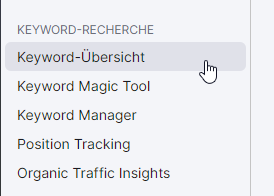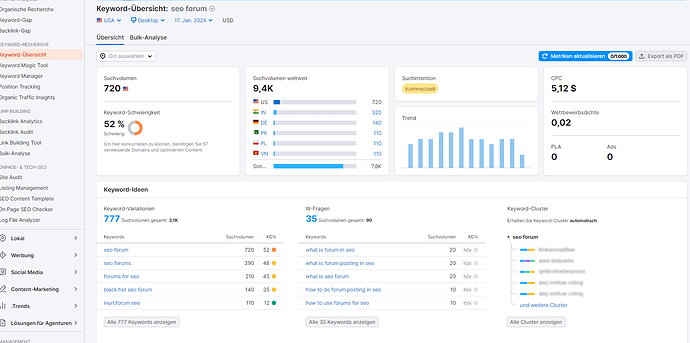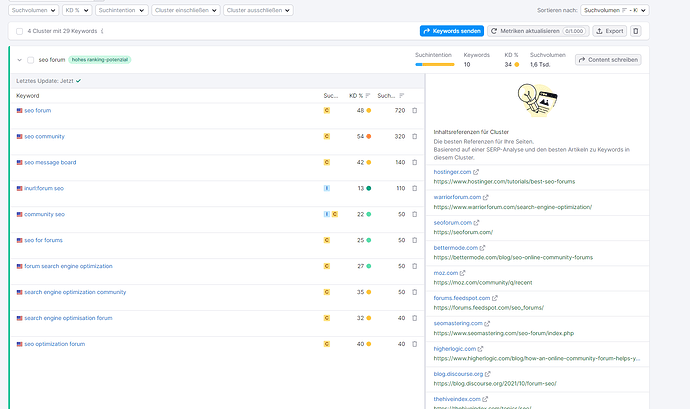Hey all. I’m Lucas, owner of SEOforums.net and SEOlucas.com! This is the first post. It is about how to do keyword research for your website - the right way.
Why Keywords are important - Understanding Keywords
SEO Keywords play a crucial role in bridging the gap between your website’s content and your audience’s needs. They act as indicators for both search engines like Google and your visitors, succinctly conveying the subject matter of your page. Recognizing and aligning with your audience’s search intent is vital. By understanding and fulfilling what your visitors are searching for, you can effectively meet their needs and enhance your website’s relevance and appeal.
In easy words: You tell Google (and the visitor) what your website is about.
Short-Tail vs. Long-Tail, Informational vs. Transactional
- Short-Tail Keywords: These are broad, often one to two-word phrases with a high search volume. Short-tail keywords are typically more competitive due to their generic nature. For instance, “shoes” or “coffee.”
- Long-Tail Keywords: In contrast to short-tail keywords, long-tail keywords are longer, more specific phrases that usually consist of three or more words. They have a lower search volume but can attract more targeted traffic, leading to higher conversion rates. An example could be “women’s waterproof hiking shoes” or “organic coffee beans online.”
- Informational Keywords: These keywords are used when searchers are looking for information. They often start with words like “how to,” “what is,” “guide to,” etc. Informational keywords are crucial for content aiming to educate or inform, such as blog posts or tutorial videos. An example might be “how to brew pour-over coffee” or “guide to buying running shoes.”
- Transactional Keywords: Contrary to informational keywords, transactional keywords are used by searchers who are considering a purchase or a specific action. These often include terms like “buy,” “for sale,” “subscription,” or “price.” They are integral for e-commerce sites and business pages. Examples include “buy espresso machine online” or “best deals on men’s running shoes.”
Relevance, Search Volume, and Competition
- Relevance: The cornerstone of effective SEO, relevance ensures that your keywords align closely with your content and what your target audience is searching for. Relevant keywords increase the likelihood of attracting visitors who are genuinely interested in your products or services. It’s about matching the user’s intent, whether they’re seeking information, looking to make a purchase, or simply exploring a topic.
- Search Volume: This metric indicates the number of searches a particular keyword receives over a specified period. High search volume keywords can drive significant traffic to your site, but they are often highly competitive. Conversely, low search volume keywords might not attract as much traffic, but they can be valuable in targeting niche audiences and specific queries, often leading to higher engagement and conversion rates.
- Competition: Understanding the level of competition for certain keywords is crucial. Highly competitive keywords are often dominated by established websites with strong authority, making it challenging for newer or smaller sites to rank for these terms. Targeting less competitive keywords, especially in the beginning, can be a more effective strategy, allowing you to build up your site’s authority and gradually tackle more competitive terms.
Balancing these three aspects - relevance, search volume, and competition - is key to selecting the most effective keywords for your SEO strategy. It involves a strategic approach, where you aim to find keywords that are not only relevant and in demand but also realistically achievable for your site to rank for.
Finding Keyword Ideas
Ask yourself: What does my website offer? What is my visitor looking for? Simply start by identifying the core themes of your website or business. What are you offering? Who is your target audience?
Create a list of initial keyword ideas that reflect your offerings and align with your audience’s potential search queries. These should include both broad topics and more specific aspects of your niche.
Example
Your website is an ecommerce shop offering Organic Skincare Products.
When creating a list of initial keyword ideas for a business specializing in organic skincare products, it’s important to cover a range of topics that reflect both the broader market and specific aspects of the niche. Here’s an example of how you might approach this:
- Broad Topics: Start with general keywords that describe your industry or main product categories. Examples for an organic skincare business might include “organic skincare,” “natural skin products,” “eco-friendly beauty products.”
- Specific Product Types: Delve into keywords that describe your specific products. For instance, “organic facial cleanser,” “natural moisturizing cream,” “vegan skincare serums.”
- Ingredients and Benefits: Since your niche is organic skincare, keywords related to the ingredients and their benefits can be highly relevant. Examples include “aloe vera skincare,” “paraben-free skin products,” “benefits of organic skincare.”
- Target Audience: Consider keywords that your target audience might use, related to their needs or concerns. For example, “skincare for sensitive skin,” “organic acne solutions,” “anti-aging natural remedies.”
- Local Keywords: If your business serves a specific geographic area or has a significant local customer base, include location-based keywords. For instance, “organic skincare products in New York,” “local natural beauty store in Los Angeles.”
It is important to not approach very-high-competitive keywords. You can check it with tools like Semrush or Ahrefs
Example: Using Semrush to find keywords
You can activate a trial period for Semrush (7 days): Semrush Subscription Plans Comparison
Now I’ll show you how to find keyword ideas using Semrush:
Add a new project (here, seoforums.net) :
Using SemRush you’ll have several keyword tools:

Keyword overview, Magic tool, Manager.
Keyword Overview
This helps you to check out keyword infos
Keyword Magic Tool
The Magic Tool shows you a similar keyword list.
Keyword Manager
You can add keywords and track your position. It makes it easy to follow progress.
Check out your competitor rankings
You can use tools like Semrush, Ahrefs etc, to check out the performance of your competitors SEO. I also use Similarweb (https://www.similarweb.com/) to check website traffic.



